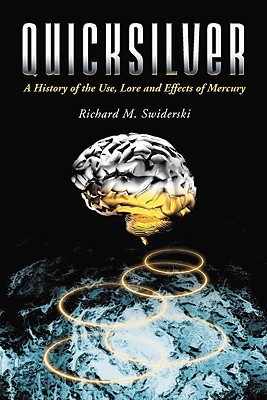
- We will send in 10–14 business days.
- Author: Richard M Swiderski
- Publisher: McFarland & Company
- ISBN-10: 0786435968
- ISBN-13: 9780786435968
- Format: 14.9 x 21.9 x 1.9 cm, minkšti viršeliai
- Language: English
- SAVE -10% with code: EXTRA
Reviews
Description
Though modern scientists recognize mercury as a harmful environmental pollutant and one of the world's most dangerous elemental toxins, mercury was once considered a wondrous substance capable of eradicating internal disease, revolutionizing the paint and cosmetics industries and even entertaining the masses as part of amateur magic tricks and witch doctor scams. This work traces the history of mercury in popular culture, beginning in the early eighteenth century when Dr. Thomas Dover, nicknamed Dr. Quicksilver, began prescribing doses of raw mercury to clear out intestinal blockages and rid the body of syphilis and other diseases. The author then details the role of mercury in several medical, industrial, and cultural applications. In the fields of dentistry and vaccination, mercury continues to be used as a preservative and amalgamative agent. In the cosmetics industry, mercury was once used as a popular skin lightener in soaps and skin creams. In the early development of obstetrics and gynecology, mercury was once used to stimulate conception and fetal abortion. Many more uses of mercury, along with many more, are outlined in the work, while several appendices provide translations of rare works which reference mercury.
EXTRA 10 % discount with code: EXTRA
The promotion ends in 21d.22:17:53
The discount code is valid when purchasing from 10 €. Discounts do not stack.
- Author: Richard M Swiderski
- Publisher: McFarland & Company
- ISBN-10: 0786435968
- ISBN-13: 9780786435968
- Format: 14.9 x 21.9 x 1.9 cm, minkšti viršeliai
- Language: English English
Though modern scientists recognize mercury as a harmful environmental pollutant and one of the world's most dangerous elemental toxins, mercury was once considered a wondrous substance capable of eradicating internal disease, revolutionizing the paint and cosmetics industries and even entertaining the masses as part of amateur magic tricks and witch doctor scams. This work traces the history of mercury in popular culture, beginning in the early eighteenth century when Dr. Thomas Dover, nicknamed Dr. Quicksilver, began prescribing doses of raw mercury to clear out intestinal blockages and rid the body of syphilis and other diseases. The author then details the role of mercury in several medical, industrial, and cultural applications. In the fields of dentistry and vaccination, mercury continues to be used as a preservative and amalgamative agent. In the cosmetics industry, mercury was once used as a popular skin lightener in soaps and skin creams. In the early development of obstetrics and gynecology, mercury was once used to stimulate conception and fetal abortion. Many more uses of mercury, along with many more, are outlined in the work, while several appendices provide translations of rare works which reference mercury.


Reviews